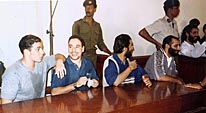
In the Case of the 8 Britons and 2 Algerians in Aden Appealing the Verdict [Archives:1999/33/Law & Diplomacy]
August 16 1999
In an interview with Yemen Times Aden Bureau Chief Editor, Mr. Ba-Sunaid explained the whole story from the beginning:
Quote
“In the first week of January 1999, Mr. Rashad Yakoub, the British national who was the lead lawyer for the defendants called me by phone and requested that I investigate the case and offered me to be the lawyer for the defendants in Yemen. I accepted the mandate on January 9th. Around one week later, on the 15th of January I met the defendants for the first time. Then Mr. Rashad told me to go to the general prosecution where I found that there was no accusation at all against my the defendants. The Britons and Algerians were captured and put to jail on the 23rd of December 1998. They were put to jail and were interrogated for more than 20 days, till the 15th of January 1999. The general attorney accused them orally (not written) showing them the explosives, mines and weapons. All my defendants have denied any relation with Abu Al-Hassan and the Abyan Army. The interrogations were carried out after the problems between Britain and Yemen without any clear crime or accusation.

Unqoute
Mr. Ba Sunaid appealed the case in which seven of the men, were sentenced to terms between three and seven years in jail, among them was the famous London-based fundamentalist Abu Hamza’s son, Mohamed Mustafa Kamil who was sentenced to a three years imprisonment. The rest three men were sentenced to time already served.
Based on foreign sources, the verdict was not welcomed at all in Britain. Even though the British government respects the judicial law in Yemen, but they still have shown concern over the latest allegations regarding torture claims in jail. Hence, they prefer having the prisoners to serve their sentences in England where they will not face such allegations.
However, regarding British Prime Minister’s latest letter to President Saleh asking about the torture allegations and the case, some sources say that the response of President Saleh was negative in stating that he cannot interfere in any way into the judicial system of the country because it is a totally independent system. Just yesterday, the British Embassy in Sanaa had denied the reports that PM Blair had asked President Saleh to Interfere.
Currently there are two appeals, one from the defendants, and one from the prosecution. The general prosecutor in the case, Saeed Al-Aqil, confirmed his appeal by stating, “We will try to bring the sentence to its maximum, which is 10 years in jail.”During the trial of the defendants, their families accused the British government of not treating them as the others because of their religion or race. They were especially angry at the weak response of the British government towards the torture allegations during the interrogation period. In regards to the torture claims, the human rights activist, Mr. A. Shamsy of Germany reached negative conclusions on Yemen’s adherence to human rights. “I was one of the first few people to meet with the accused individuals, right after the first sitting of the court. From the scars and bruises on their body, and from the details of separate and independent accounts of the accused, I could see that they were subjected to various forms of torture, notably the ‘falaqa’. This is contrary to Yemeni law, as well as to international law,” he said in an interview with Yemen Times at the beginning of this year.
As a response to these claims, British Foreign Minister, Mr. Peter Hain stated, “I reject flatly the allegations that have come from some, including I think within the families and their community, that this has been somehow a different treatment of British Moslems from other British citizens. It hasn’t.”
——
[archive-e:33-v:1999-y:1999-d:1999-08-16-p:./1999/iss33/l&d.htm]


